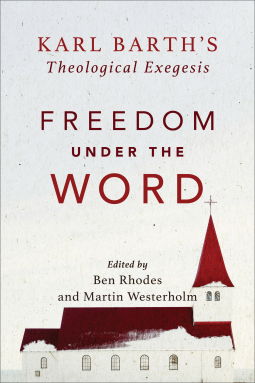
Freedom under the Word
Karl Barth's Theological Exegesis
by Ben Rhodes, Martin Westerholm
This title was previously available on NetGalley and is now archived.
Send NetGalley books directly to your Kindle or Kindle app
1
To read on a Kindle or Kindle app, please add kindle@netgalley.com as an approved email address to receive files in your Amazon account. Click here for step-by-step instructions.
2
Also find your Kindle email address within your Amazon account, and enter it here.
Pub Date Jun 04 2019 | Archive Date May 10 2019
Baker Academic & Brazos Press | Baker Academic
Talking about this book? Use #FreedomUnderTheWord #NetGalley. More hashtag tips!
Description
Available Editions
| EDITION | Other Format |
| ISBN | 9780801098819 |
| PRICE | $50.00 (USD) |
| PAGES | 336 |
Featured Reviews
Like the works of Karl Barth himself, this was not an easy read, but an immensely worthwhile one. In not only evaluating Barth's work, but creating a broader environment in which we should consider what it means to have a high view of Scripture, and to read it well, this book achieves its goal. The development of a theology of Scripture clearly began with Barth's seemingly inexhaustible Christology; something to which all the contributing authors were faithful and thoughtful. This book is not aimed at the layman and can be hard work at times (especially if you're unfamiliar with Barth's work), but it is well worth investing in, and will produce a reward in the form of seeing living under the word as truly the most wonderful, ultimate existence for humanity.
 Sergiu P, Reviewer
Sergiu P, Reviewer
I was thinking that this book was written by barth fanatics who would try to twist everything barth said in a positive light.
I was wrong.
The authors are very well informed and have diligently studied barth. They criticize barth when appropriate and commend him when appropriate. I would recommend this book to anyone who wants to understand barth.
Freedom under the Word: Karl Barth's Theological Exegesis is a collection of essays by various scholars who critically engage with Barth's interpretation of Christian Scripture and its implications for contemporary hermeneutics and biblical studies. The book covers Barth's career chronologically, from his early commentaries on Romans and Ephesians to his mature dogmatics on the doctrines of God, creation, and reconciliation. The contributors explore how Barth's theological exegesis is shaped by his Christocentric approach, his dialectical method, his ecclesial context, and his ethical concerns. The book also highlights some of the rare texts from the Barth corpus, such as his lectures on James, Isaiah, and Revelation, and his exegesis of Genesis 2:8-17 and Hebrews 11. Some examples of the topics discussed in the book are Barth's rewriting of Romans in light of the First World War, Barth's relation to the historical-critical method of biblical scholarship, Barth's use of the Johannine prologue to articulate his doctrine of God, Barth's understanding of Israel and the church in Romans 9-11, and Barth's eschatological vision in Revelation 4-5. The book aims to show the legacy and potential of Barth's theology for contemporary hermeneutics and biblical interpretation, as well as to stimulate further dialogue between Barth scholars and biblical scholars.



